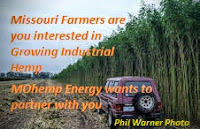Industrial Hemp Startup
Missouri Farmers- You have the Land. MOhemp Energy will have the machines needed to process Industrial Hemp. Lets work together and produce:
Energy Producers will buy affordable home grown sustainable power supply that is grown, processed and packaged by MOhemp Energy.
 |
| MOhemp Energy Field Processing System image |
It all starts on the Farm! Paul Harvey says it best:
And on the 8th day, God looked down on his planned paradise and said, "I need a caretaker." So God made a farmer.
God said, "I need somebody willing to get up before dawn, milk cows, work all day in the fields, milk cows again, eat supper and then go to town and stay past midnight at a meeting of the school board." So God made a farmer.
"I need somebody with arms strong enough to rustle a calf and yet gentle enough to deliver his own grandchild. Somebody to call hogs, tame cantankerous machinery, come home hungry, have to wait lunch until his wife's done feeding visiting ladies and tell the ladies to be sure and come back real soon -- and mean it." So God made a farmer.
 |
| Industrial Hemp-It All Starts on a Farm! |
God said, "I need somebody willing to sit up all night with a newborn colt. And watch it die. Then dry his eyes and say, 'Maybe next year.' I need somebody who can shape an ax handle from a persimmon sprout, shoe a horse with a hunk of car tire, who can make harness out of haywire, feed sacks and shoe scraps. And who, planting time and harvest season, will finish his forty-hour week by Tuesday noon, then, pain'n from 'tractor back,' put in another seventy-two hours." So God made a farmer.
God had to have somebody willing to ride the ruts at double speed to get the hay in ahead of the rain clouds and yet stop in mid-field and race to help when he sees the first smoke from a neighbor's place. So God made a farmer.
God said, "I need somebody strong enough to clear trees and heave bails, yet gentle enough to tame lambs and wean pigs and tend the pink-combed pullets, who will stop his mower for an hour to splint the broken leg of a meadow lark. It had to be somebody who'd plow deep and straight and not cut corners.
Somebody to seed, weed, feed, breed and rake and disc and plow and plant and tie the fleece and strain the milk and replenish the self-feeder and finish a hard week's work with a five-mile drive to church.
"Somebody who'd bale a family together with the soft strong bonds of sharing, who would laugh and then sigh, and then reply, with smiling eyes, when his son says he wants to spend his life 'doing what dad does.'" So God made a farmer.


